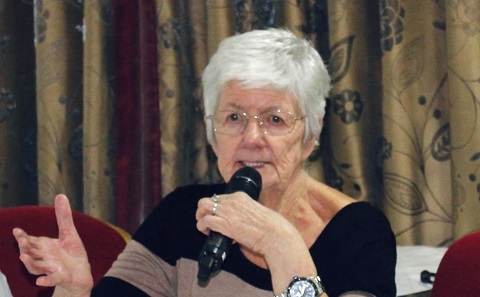Targeted treatment could provide new hope for patients with cancer caused by asbestos

A new clinical trial will test whether a type of targeted cancer treatment could improve survival for people with a rare and aggressive form of cancer.
Mesothelioma develops in the lining of the lungs or abdomen, with most cases linked to breathing in asbestos fibres. Currently only five per cent of people survive five years after diagnosis.
Researchers at the Cancer Research UK Southampton Clinical Trials Unit and University of Leicester are now testing whether a type of drug called a PARP inhibitor could be an effective treatment and give mesothelioma patients more time with their loved ones.
“There is an urgent need to explore more effective approaches and different therapies for this aggressive form of cancer,” says Professor Gareth Griffiths, Director of the Southampton Clinical Trials Unit.
“We recently published the results of the CONFIRM trial, the first study of its kind to show that an immunotherapy treatment improved survival for patients with mesothelioma. This was a huge breakthrough, and immunotherapy has now been included in European treatment guidelines for mesothelioma. But if patients fail on standard of care treatment mesothelioma remains an incurable disease and therefore further research into other treatment options, in addition to just active symptom control, is desperately needed.”

PARP inhibitors have already been shown to improve the survival of patients with breast and ovarian cancers that carry specific mutations. They work by blocking a protein which helps repair damaged DNA in cancer cells, thereby causing the cancer cells to die.
Mesothelioma patients whose tumours have progressed following chemotherapy and are therefore more likely to be susceptible to a PARP inhibitor, will be invited to join the NERO trial where they will be given a drug called niraparib.
Dean Fennell, Professor of thoracic medical oncology at the University of Leicester and Chief Investigator of the NERO trial, says: “In a previous, small study called the MiST1 trial, we showed that mesothelioma does respond to this type of drug, but further investigation is needed to test whether PARP inhibitors could be a new treatment option for patients. If the NERO trial is positive, this study will lead to the approval of a new medicine for use around the world, one that would extend the life expectancy of patients following initial chemotherapy.”
Mavis Nye was diagnosed with mesothelioma in 2009 and took part in a previous clinical trial for an immunotherapy treatment which led to her cancer shrinking away. “I initially had a complete response to the trial treatment, and I have been living a near normal life,” says Mavis. “But more recently a scan has shown that the mesothelioma is returning, very slowly, but it has returned with the scan showing thickenings in so many organs.”
Mavis is passionate about finding new treatments for mesothelioma patients and is now working with the NERO trial team as a patient co-investigator.

“I can’t tell you how disappointed I am that the only treatment now left for me is chemotherapy. We desperately need more research into better treatments for this disease. I just love being involved in research, and it is wonderful that I can play a small part in the Nero trial; if not for me then for other mesothelioma patients in the future.”
NERO will recruit 84 patients who have already had chemotherapy treatment at hospitals across the UK. Patients will be randomly allocated into one of two arms within the trial, with a 2:1 chance of receiving niraparib so that the researchers can compare the effect of the drug on the tumour. Those patients who do not receive niraparib will be closely monitored for signs of early tumour growth so that they can go on to receive an alternative treatment if necessary.
NERO is funded by Asthma and Lung UK and developed in collaboration with Mesothelioma UK, with additional support from Cancer Research UK core funding at the Southampton Clinical Trials Unit.
Watch our explainer video on the NERO trial
Notes for editors
The NERO trial – To find more details about the trial, please visit the trial webpage.
Figures from Cancer Research UK mesothelioma webpage.
The Southampton Clinical Trials Unit (SCTU) is a Cancer Research UK funded CTU with expertise in the design, conduct and analysis of interventional, multi-centre clinical trials. The CTU is based within the University of Southampton with offices at the University Hospital Southampton NHS Foundation Trust Southampton General Hospital site. For more information, visit the SCTU website, or follow us on Twitter or Facebook.
*****The CONFIRM trial - Nivolumab versus placebo in patients with relapsed malignant mesothelioma (CONFIRM): a multicentre, double-blind, randomised, phase 3 trial. Read the full publication in The Lancet Oncology
*****The MiST1 trial - Rucaparib in patients with BAP1-deficient or BRCA1-deficient mesothelioma (MiST1): an open-label, single-arm, phase 2a clinical trial. Read the full publication in The Lancet Respiratory Medicine.